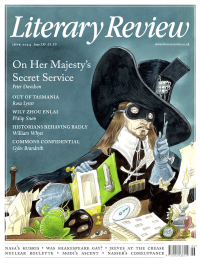Salley Vickers
In the Beginning
Reading Genesis
By Marilynne Robinson
Virago 352pp £25
Marilynne Robinson, whose acclaimed novels boldly explore the unfashionable subject of religious conviction, has now applied her judicious mind to Genesis, the first book of the Old Testament and the dramatic opener to the whole Bible. Genesis is supposedly the horse’s-mouth story of our origins, as told by God to Moses. Modern scholarship more mundanely suggests it was assembled in the form we know it sometime between the 8th and 6th centuries BC from three literary sources, each usually identified by a letter: two early sources, J, the Jahwist or Yahwist, and E, the Elohist, which take their names from Hebrew words for God, and P, the later Priestly source. Robinson eschews the concept of the book as a patchwork, preferring to consider it as a coherent whole. She usefully compares it to other myths from the ancient Near East, noting that unlike the Babylonian gods, who are ‘volatile, impulsive, but also needy’ and whose attitude to mortal beings is distant and disdainful, the Genesis God has a deeply personal involvement in and a profound care for His creation. In Genesis chapter two, which is derived from the J source, God plants a garden with trees that are not only fruitful but also delightful to behold; Eve is constructed from Adam’s rib specifically so that Adam will not be lonely. In chapter one, which comes from the P source, God betrays a similar characteristic: having created the universe, at each stage He pauses to observe ‘that it was good’. Most notably, and this is what makes Genesis so distinctive among the religious texts of the era, this God is not part of a pantheon. He is the one and only deity, and humankind is created in His likeness and image (here, Genesis anticipates the appearance of God in human form with the birth of Jesus of Nazareth).
God’s new-minted humans famously fail His faith in them when they defy the injunction not to eat the fruit of the tree that will endow them with knowledge of good and evil (and thus become ‘as gods’) – the first of the many derelictions through which the human race will disappoint its creator. The pair are banished to till the soil from which they have been fashioned, but, as Robinson observes, it is the soil that God curses rather than His living experiment – though as a consequence of their actions humans remain under sentence of mortality. Throughout her book, Robinson makes a passionate case for God’s fundamental tenderness towards His flawed creation, which betokens, she argues, ‘a profound and essential assertion of the sacred good’. When Cain murders his brother Abel – sibling rivalry, it seems, is a primal impulse – God, for all His displeasure, not only spares Cain’s life but also places His ‘mark’ on him so that no mortal will attempt to harm him. Cain is free to found a city and a dynasty, from which springs another key player in this drama of our origins. Cain’s descendant Noah becomes the vessel through which all living species are preserved when his maker, regretting His creation, determines to destroy it in an all-consuming flood. Flood stories were common at the time, the Sumerian Epic of Gilgamesh being an obvious source for this episode. But again, Robinson finds in the Genesis God a unique mercy. When the flood subsides, He resolves to bear with the ‘evil devisings’ of the human heart and henceforth to forgo any such annihilations. He renews with Noah the generous and generative injunction first given to Adam: ‘be fruitful and multiply’.
Genesis is made up of two parts. It opens with the myth of universal origins. This is followed by the more parochial tales of the patriarchs, Abraham, Isaac and Jacob, and Jacob’s son Joseph, the formation narrative of the nation of Israel. The second element best evokes the novelist’s sensibility

Sign Up to our newsletter
Receive free articles, highlights from the archive, news, details of prizes, and much more.@Lit_Review
Follow Literary Review on Twitter
Twitter Feed
It wasn’t until 1825 that Pepys’s diary became available for the first time. How it was eventually decrypted and published is a story of subterfuge and duplicity.
Kate Loveman tells the tale.
Kate Loveman - Publishing Pepys
Kate Loveman: Publishing Pepys
literaryreview.co.uk
Arthur Christopher Benson was a pillar of the Edwardian establishment. He was supremely well connected. As his newly published diaries reveal, he was also riotously indiscreet.
Piers Brendon compares Benson’s journals to others from the 20th century.
Piers Brendon - Land of Dopes & Tories
Piers Brendon: Land of Dopes & Tories - The Benson Diaries: Selections from the Diary of Arthur Christopher Benson by Eamon Duffy & Ronald Hyam (edd)
literaryreview.co.uk
Of the siblings Gwen and Augustus John, it is Augustus who has commanded most attention from collectors and connoisseurs.
Was he really the finer artist, asks Tanya Harrod, or is it time Gwen emerged from her brother’s shadow?
Tanya Harrod - Cut from the Same Canvas
Tanya Harrod: Cut from the Same Canvas - Artists, Siblings, Visionaries: The Lives and Loves of Gwen and Augustus John by Judith Mackrell
literaryreview.co.uk